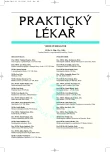-
Medical journals
- Career
What have the new recommendations for cardiovascular disease prevention in adults taught us – is it necessary to recalculate a previously assessed risk?
Authors: E. Sovová
Authors‘ workplace: University Palackého v Olomouci ; I. interní klinika Fakultní nemocnice Olomouc a Lékařské fakulty
Published in: Prakt. Lék. 2006; 86(9): 507-511
Category: Of different specialties
Overview
Background:
Cardiovascular disease (CVD) is the most frequent cause of death in the Czech Republic. With regard to new knowledge about the risk factors of CVD, new guidelines for CVD prevention were published in 2005. The aim of our study was to illustrate new approaches in providing of CVD prevention and to compare two scoring schemes - Framingham and SCORE.Methods and results:
The risk of CVD was calculated with a new scoring scheme (SCORE) in two groups of patients - the first group of 174 patients (128 male), average age 45.8±11,36 (men 43,64±12,22, women 49,08±7,23) with high CVD risk by Framingham scoring scheme (20–40 % in the age of 60 years) and the second group of 174 patients (139 male), average age 39,89±12,26 (men 37,25±12,14, women 50,40±4,9) with medium CVD risk by Framingham scoring scheme (10–20 % at the age of 60 years). When using the SCORE scoring scheme more patients were classified as high risk patients in the second group. The statistical test (McNemara) revealed a significant shift in risk assessment between these two scoring schemes (p 0,001). The results of these two methods are consistent in 66.7 % of cases. 33 % of patients are in the higher CVD risk group by SCORE scheme.Conclusion:
We recommend calculating CVD risk in all patients using the new SCORE scoring scheme, especially in patients with medium CVD risk by Framingham scoring scheme.Key words:
prevention, cardiovascular diseases, risk calculating
Labels
General practitioner for children and adolescents General practitioner for adults
Article was published inGeneral Practitioner

2006 Issue 9-
All articles in this issue
- Prevention of diseases using modern information technologies – interactive web pages and their effect
- Emergency resuscitation in the front line
- Red blood cells transfusion in critically ill from the point of view of evidence based medicine: new limits, new risks?
- What have the new recommendations for cardiovascular disease prevention in adults taught us – is it necessary to recalculate a previously assessed risk?
- Tandem Heart used for treatment of the most severe forms of heart failure – left ventricular support
- Chronic viral hepatitises and their health and social aspects at general practitioner
- Epiglotitis – The Experience with patients hospitalized in RES FN Motol
- News in treatment modalities of hypertension
- Non-setroidal anti-inflammatory drugs – use in treatment of cardiovascular disease an cardiovascular risks
- Oral anticoagulant therapy
- General Practitioner
- Journal archive
- Current issue
- Online only
- About the journal
Most read in this issue- Tandem Heart used for treatment of the most severe forms of heart failure – left ventricular support
- Oral anticoagulant therapy
- Epiglotitis – The Experience with patients hospitalized in RES FN Motol
- Non-setroidal anti-inflammatory drugs – use in treatment of cardiovascular disease an cardiovascular risks
Login#ADS_BOTTOM_SCRIPTS#Forgotten passwordEnter the email address that you registered with. We will send you instructions on how to set a new password.
- Career

